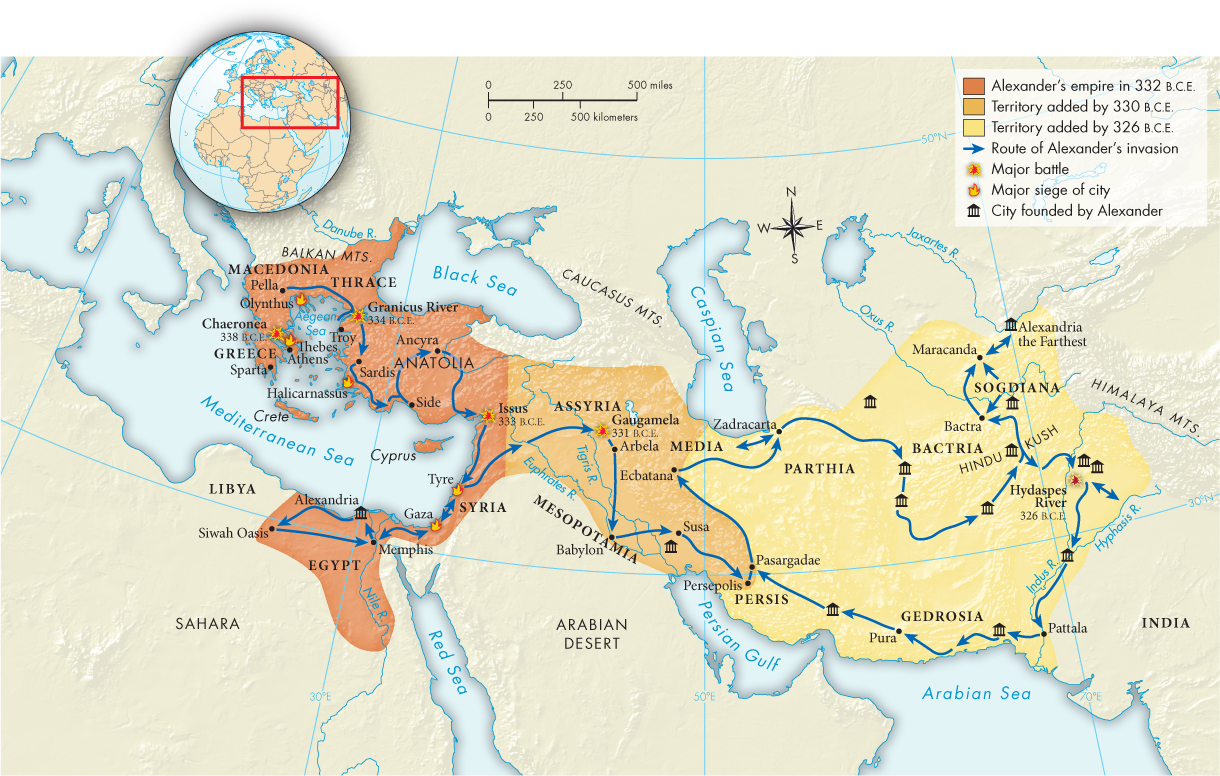A History of World Societies:
Printed Page 131
A History of World Societies Value
Edition: Printed Page 129
From Polis to Monarchy, 404–200 B.C.E.
Immediately after the Peloponnesian War, Sparta began striving for empire over all of the Greeks but could not maintain its hold. In 371 B.C.E. an army from the polis of Thebes destroyed the Spartan army, but the Thebans were unable to bring peace to Greece. Philip II, ruler of the kingdom of Macedonia on the northern border of Greece (r. 359–
After his victory, Philip united the Greek states with his Macedonian kingdom and got the states to cooperate in a crusade to liberate the Ionian Greeks from Persian rule. Before he could launch his crusade, Philip fell to an assassin’s dagger in 336 B.C.E. His young son Alexander, who had been tutored by Aristotle, vowed to carry on Philip’s mission and led an army of Macedonians and Greeks into western Asia. He won major battles against the Persians and seized Egypt from them without a fight. After honoring the priestly class, Alexander was proclaimed pharaoh, the legitimate ruler of Egypt. He ordered the building of a new city where the Nile meets the Mediterranean, a city that would soon be called Alexandria and that within a century would grow into an enormous city, rivaling Chang-
By 330 B.C.E. the Persian Empire had fallen, but Alexander had no intention of stopping, and he set out to conquer much of the rest of Asia. He plunged eastward into lands completely unknown to the Greek world. After four years of fighting his soldiers crossed the Indus River (in the area that is now Pakistan), and finally, at the Hyphasis River, the troops refused to go farther. Alexander was enraged by the mutiny, but the army stood firm. Still eager to explore the limits of the world, Alexander turned south to the Arabian Sea and then back west (Map 5.3).

He never saw Macedonia again, however, as he died in Babylon in 323 B.C.E. from fever, wounds, and excessive drinking. He was only thirty-
Ptolemy (TAH-
To encourage obedience, Hellenistic kings often created ruler cults that linked the king’s authority with that of the gods, or they adopted ruler cults that already existed, as Alexander did in Egypt. This created a symbol of unity within kingdoms ruling different peoples who at first had little in common; however, these kingdoms never won the deep emotional loyalty that Greeks had once felt for the polis. Kings sometimes gave the cities in their territory all the external trappings of a polis, such as a council or an assembly of citizens, but these had no power. The city was not autonomous, as the polis had been, but had to follow royal orders. Hellenistic rulers generally relied on paid professionals to staff their bureaucracies and on trained, paid, full-